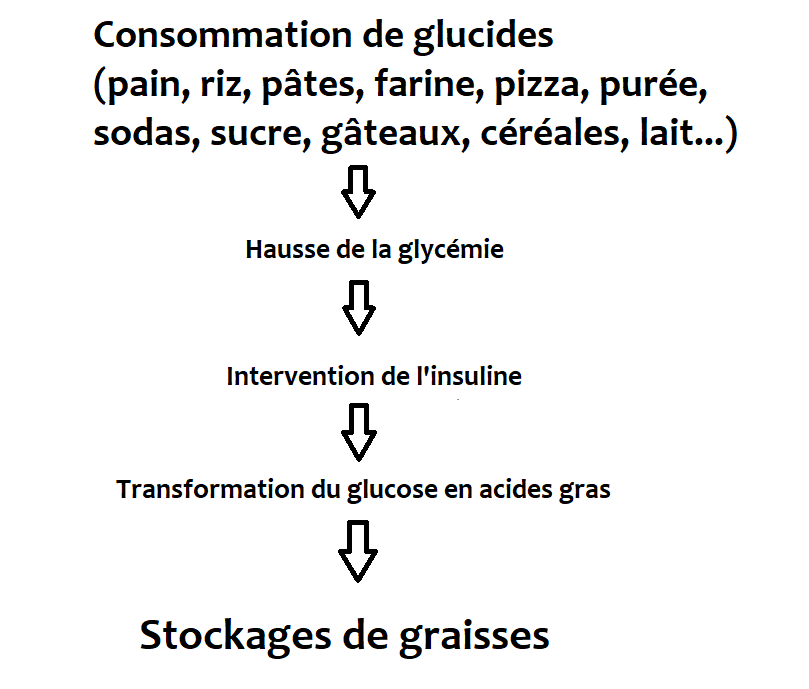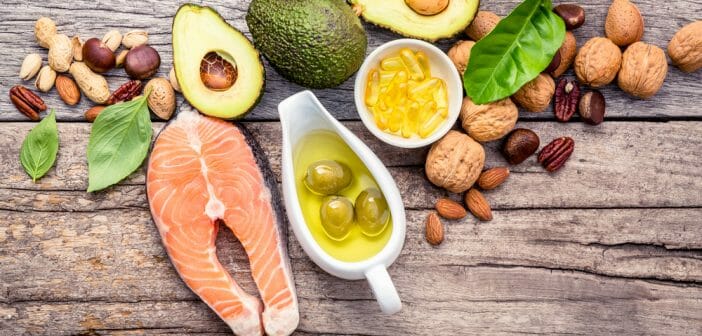Welcome to the Blooness guide, the ideal food for mankind.
You are here :
Blooness guide > Low-carb and keto food guide > Fat's comeback: eat fat to lose weight and stay healthy
We are at the 4th chapter of the low-carbohydrate diet tomeand this chapter is dedicated to fat makes a comebackhow new-wave nutritionists and enlightened gourmets came to the realization that fats were not as harmful as we were led to believe - quite the contrary.
Find out more about this chapter in the ideal diet for mankind in PODCAST format:
As we have seen in previous chapters, in promoting sugar and carbohydratesthe agri-food industry has mechanically driven reduced lipid consumption.
This content is part of the guide Blooness, the guide to the ideal human diet, the summary of which you can find here 🌱🥑
From the 1980s onwards, under the impetus of the sugar lobby, the American public authorities recommended an intake of carbohydrates over the rest of the macronutrientsand suggested reducing the share of fats in the diet, on the pretext that they could lead to cardiovascular disease.
For example, the consumption of pasta, rice and wheat, cerealsThe amount of food consumed - bread, rusks, fruit, juice, potatoes - has soared. And at the same time, obesity has followed suit. Yet all these foods, which form the core of the modern Western diet, have one thing in common: their high content of carbohydrates.
But how can we explain the potential link between carbohydrate consumption and obesity? Do carbohydrates make you fat?
What if fat actually helps you lose weight? What if lipids weren't so bad for your health after all?
This is precisely the thesis increasingly shared by certain nutritionists. "Emergingwho believe that a diet too rich in carbohydrates would be too energetic for the sedentary people that we are, and would lead to a de facto storage of fats in the body, leading to overweight in the mildest cases, and obesity, cardiovascular disease, diabetes and autoimmune disease in the most serious cases.
Common wisdom has it that eating fat makes you fat. It's a line of reasoning that's very easy for consumers to swallow, because it seems perfectly logical. That's why supermarket shelves have been invaded by low-fat or even 0% products.
As a result, figure-conscious consumers have favoured these products, and reduced their intake of fat as much as possible. fats in their diet, depriving themselves of lipids, this macronutrient which is actually extremely important for the body, and may even help you slim down.
To understand why fats are ultimately beneficial, we need to look at the very definition of fats. lipidsand how they are metabolized.
Fats, indispensable to the body
First of all, fats have played a key role in human evolution. They are an essential form of energy for the body, sealing cell membranes and guaranteeing exchanges.
Without the fatsno hormone transport, no neuronal activity, and no reproduction. Visit lipids guarantee the body's equilibrium.
And even saturated and animal fats, which have been blamed for everything, are actually beneficial to health, in the right proportions and at the right times of day.
Why is it that eating fat can help you slim down, while eating "carbohydrates" can make you overweight?
To understand how fats can slim the bodyand how carbohydrates (starchy foods, wheat, rice, bread, pasta, sugar) can slowly and perniciously make you fatter, day after day, we need to look at how to make the most of carbohydrates. how insulin works.
The role of insulin in fat storage
When we eat carbohydratesthe blood glucose level rises. However, the body does not want excess glucose in the blood, as it wants to maintain a certain balance, beyond which excess can be dangerous.
This is where insulina hormone responsible for maintain blood sugar levels (known as the blood glucose) at a stable level. Insulin transports excess glucose to the cells of the muscles, liver and kidneys. but also to adipose tissue, i.e. fat reserves.
Insulin plays a vital role. It is thanks to this hormone that glycemia is maintained at a stable level, without which the consequences would be very harmful to health.
This is the problem faced by diabetics, in whom insulin is no longer able to play its hypoglycemic role, due to a malfunction of the pancreas or resistance of insulin receptors in the cells... As a result, sugar remains in the blood, and blood sugar levels soar.
Eating sugar and carbohydrates creates stored fat
It's an open secret in the world of nutrition. However, ordinary people have not been clearly informed.
In the common imagination, eating "low-fat" foods means losing weight. This has led to the proliferation of tons of diet or 0% products. These products have been a huge success in supermarkets, manufacturers have had to compensate for the low fat content with a high proportion of sugar, lactose and other unhealthy products.
At the same time, the following recommendations were made to consumers: eat a balanced diet, with fruit and vegetables. vegetablesjust take up sport, and all will be well. But the authorities have been careful not to warn people about the dangers of over-consumption of carbohydrates, to the detriment of healthy fats.
In reality, when most of our nutritional intake comes from sugar and more generally carbohydrates via a "standard" Western diet, unless you're a great athlete or have a high-energy daily activity, our body doesn't know what to do with this excessive carbohydrate intake.
Insulin will therefore send some of the glucose to the muscles, which will quickly become saturated in the absence of exercise such as weight training. The liver will also be saturated, and this is how carbohydrates are transformed into... fats.

Excessive consumption of sugar and carbohydrates is therefore the main cause of fat storage and therefore weight gain, and consequently of the illnesses that result from being overweight, and not the consumption of dietary fats as is often accepted in the common imagination.
Should you eat fat to lose weight?
That's the question on everyone's lips. If the carbohydratesconsumed without moderation to the detriment of proteins What should I do?
Should priority be given to proteinsAs some plans in the 90s suggested? On the contrary, should we increase fats to the detriment of carbohydrates and proteins ? Or should we consume all three? macronutrients in equal amounts? What does this depend on, and are there particular times when one should be favored over the other, depending on defined objectives?
There are many answers to these questions, depending on a number of parameters. But generally speaking, it's it would seem that a higher intake of fats is actually recommended for better health and to prevent the body from storing glucose in the form of fat.
Nevertheless, the breakdown between macronutrients must follow a well-defined strategy, depending on the "fuel" you choose, the time of day and your energy expenditure.
Which fuel to choose: carbohydrate or fat?
First of all, a quick reminder.
The body draws most of its energy from carbohydrates and/or lipids. Proteins, on the other hand, play a role in the life of cells and in the constitution of human tissues.
To put it in the simplest possible terms, you're going to choose a dietary strategy that depends on your goals, your convictions and your health. Depending on all these parameters, you'll choose your fuel of choice between carbohydrates and fats.
Nutritional recommendationsUntil 2019, the French food safety agency Agence nationale de sécurité sanitaire de l'alimentation, de l'environnement et du travail (Anses) recommended an intake of up to 55% in the form of carbohydrates, 30 to 35% in the form of lipids, and up to 15% in the form of proteins.
If you decide to follow the official nutritional recommendations, which most people do without necessarily being aware of it, your energy comes from carbohydrates.
It's a diet that's suitable for many people, but which can quickly present limits for some. Insulin spikes, chronic fatigue, allergies, weight gain, are all signs that your carbohydrate intake may be too high for your relatively sedentary lifestyle.
It is therefore possible to increase the proportion of lipids, at the expense of carbohydrates, while keeping protein intake stable (up to 1g per kilo of body weight, every day, for a person who does not exercise every day, and up to 2g per kilo of body weight for a body-builder wishing to build muscle mass).
Choice n°1: Moderate carb
A moderate but consistent intake of carbohydrates, combined with an increase in good fats, is the first step towards a balanced diet.
This increase in lipids can only be beneficial for the body, via healthy foods such as olive oil, avocado, coconut and green vegetables (low in carbohydrates)and to the detriment of foods such as rice, bread, white flour, potatoes and sugar.
However, the pairing of these two types of food within the same meal is still a matter of debate in the world of nutrition. We'll come back to this later in the guide.
In addition to this problem, some nutrition specialists recommend that saturated fats should be consumed at a certain time of day (generally in the morning), proteins and carbohydrates in the middle of the day, as these will be burned, and then fats rich in omega-3 as well as vitamins and minerals. fiberseasily assimilated by the body. This is the principle of chrono-nutritionbut we'll come back to this in detail later.
Who is "Moderate Carb" for?
Balancing the right fats with the right carbohydrates, so that carbohydrates are significantly reduced in favor of fat, can be just the thing for people who simply want to be careful about what they eat, but have no overweight problems or particular fat loss goals.
It's also suitable for athletes, who can then focus on carbohydrate intake around their bodybuilding session, for example, but will need to increase fat and fiber intake at other meals.
Choice n°2: low carb
Some will prefer the drastically reduce carbohydrate intakeThis means keeping the right carbohydrates in small quantities (i.e. around 100 to 150g per day), while significantly increasing fat intake so as not to end up with an energy deficit and unknowingly go on a low-calorie diet, which is not the objective here.
In this case, as long as you continue to consume a certain amount of carbohydrates, you will be on a so-called "carbohydrate diet". low-carb high fat", i.e. low in carbohydrates and high in lipids, but your body will always get its energy from carbohydratesThe only exception is during prolonged exercise or fasting, when ketones may come into play (more on this later).
The advantage of such a distribution is that insulin is solicited much less intensely, thus slowing down the storage of carbohydrates in fat, and preventing post-meal fatigue.
Who is "Low Carb" for?
It's a diet that can be tested by people who tend to store fat very easily, who regularly suffer from fatigue, benign symptoms that have never been explained, and chronic allergies.
The reduction of carbohydrates and gluten often gives good results for problems of general fatigue and lack of energy. It's also an ideal diet for athletes and body-builders who want to slim down and lose fat.
Choice 3: Ketosis
Finally, you can decide to an almost total ban on carbohydratesand you'll switch to diet ketogenicwhich can be useful in certain cases, depending, once again, on your objectives, your convictions and your state of health.
This is the most extreme low-carb diet. It's difficult to follow socially, and involves a metabolic shift, since your energy will no longer come from carbohydrates, but from ketones, produced by the liver.
It's a metabolism that may seem shocking at first glance, but it has its share of benefits.
Once again, we'll come back to this in the following chapters.
The great return of fats to healthy eating
Whatever the fat/carbohydrate ratio chosen, it should ideally be based on strategy, context and conviction. For example, randomly increasing the fat content without reducing carbohydrate intake can quickly lead to weight gain, which can be the opposite of the desired objective for a slimmer person.
On the other hand, while fats are beginning to enjoy their heyday, the choice to consume them is fraught with pitfalls, as not all lipid-rich foods are created equal. The same is also true of carbohydrates. We'll come back to this point in the following chapters.
Remember that official nutritional recommendations continued in 2018 and 2019 to set a daily carbohydrate intake of 50 to 60% even though this trade-off had not yet been objectively studied, and even though more and more nutritionists were skeptical about this distribution.
However, despite these nutritional recommendations fats are currently making a strong comeback through several channels:
- firstly, under the impetus of specialists with emerging nutritional theories;
- then, by highlighting the virtues of omega-3 and 9 ;
- also via certain fitness coaches who recommend that their clients switch to a low-carb diet when they are drying out, and whose programs are achieving very encouraging results;
- and lastly, the growing suspicion that ultra-processed products, which are often composed mainly of carbohydratesThese products are easy to produce and store, and enable manufacturers to secure higher margins. For example, the potato, one of the most carbohydrate-rich of foods, is a tuber that is easy to grow and yields very high yields.
Visit lipids are back in the spotlight. The question is how and in what proportions they should be reintegrated into the modern diet, without systematically banishing the others. macronutrients.
Conclusion on the Carbohydrates VS Fats war
In conclusion, we have already seen that the sugar industry had a vested interest in concealing studies showing that sugar was unhealthy. To do this, the lobby singled out fats as the culpritby not hesitating to corrupting certain scientists.
So, in the court of public opinion, the idea that fat is necessarily fattening. This is not (entirely) true.
Therefore, sugar, and more generally carbohydrates (bread, cereals, starches) have invaded supermarket shelves.. And for good reason: they are often addictive, lead to relative satiety (and therefore encourage people to consume more and more quickly), and are easier and often less costly to produce than conventional products. fats or the proteins.
But if carbohydrates function largely as fuel for the human body, science proves year after year that their consumption in high doses, as we do in developed countries, is not advisable. Consumed in excess, they are likely to lead to pathologies, and unlike fatsThey are mostly transformed and stored as fat in the body.
So it would be the carbohydratesnot the fatsThese are not just caloric excesses.
In addition, a low-fat diet carbohydratesand rich in (good) fatsWe'll be coming back to this subject shortly.
The low-carb high-fat dietand in its most extreme version, the ketogenic dietgives the spotlight back to fatand is one of the pillars of the the Blooness diet, the ideal diet for mankind.
The following chapter is dedicated to Low-Carb nutrition...
Next chapter: introduction to the low-carb, high-fat diet.
Previous chapter: the agro-industrial lobby's hunt for fats
New: Blooness Accelerated Programs
For quick results if you are looking for
lose fat permanently,
maintain stable energy levels throughout the day,
and prevent chronic diseases.
Immediate access to the Premium Guide + all current and future programs
Limited founding rate – will soon increase to €97

